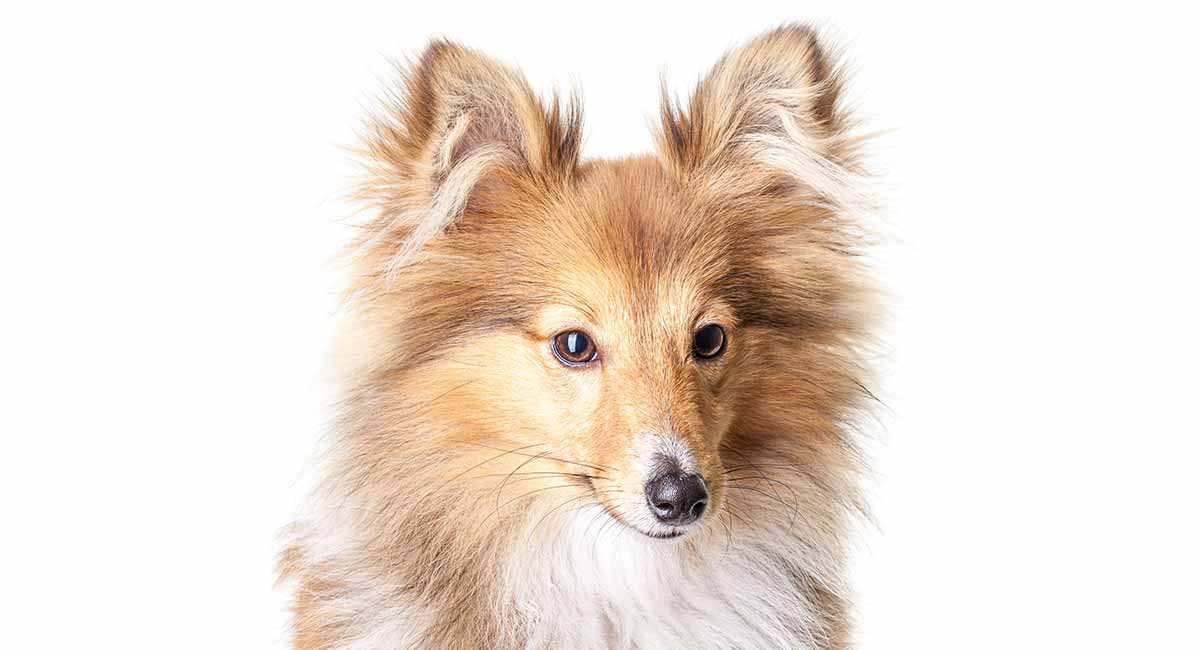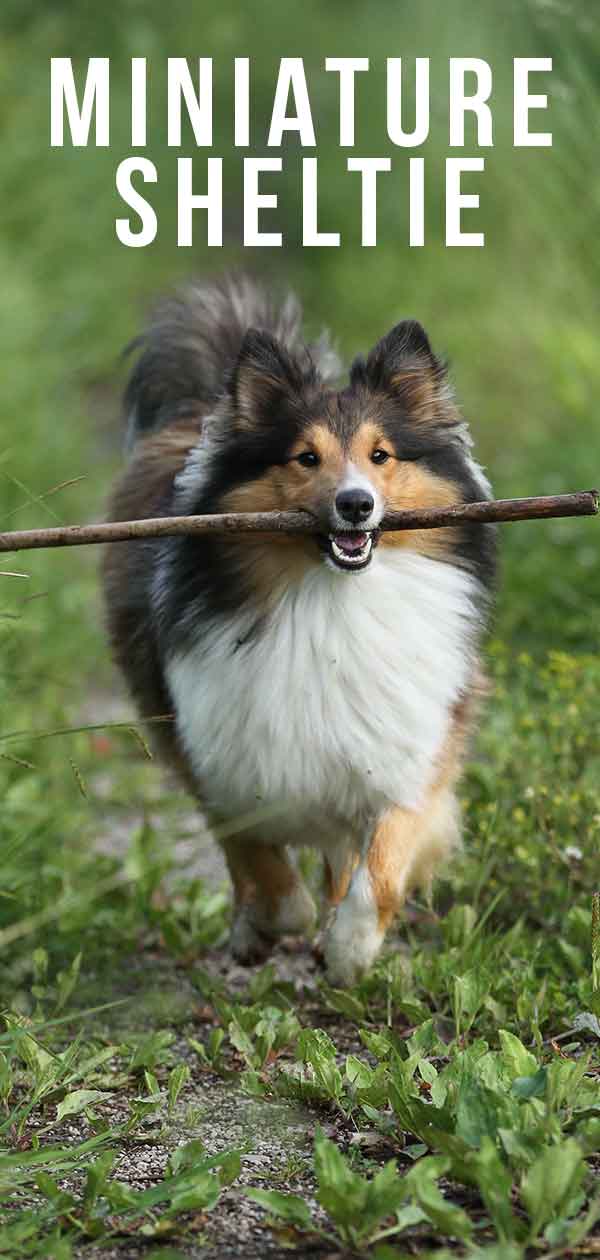
A miniature Sheltie is a Shetland Sheepdog, or Shetland Sheepdog mix, which has been bred to be much smaller than average. Just like their bigger cousins, mini Shelties are likely to be smart and energetic, with an innate herding instinct. But the process of making an established breed smaller can have some negative impacts, especially when it comes to health.
Contents
- The difference between standard and miniature dogs
- Mixing and outcrossing
- Genetic dwarfism
- Breeding from runts
Standard vs Mini Shelties
Shelties, also known as Shetland Sheepdogs, are working dogs used to herd sheep, chickens, and horses. They originate from the Shetland Islands in Scotland, UK.
The full-sized Shetland Sheepdog stands between 13-16 inches tall. On average, they weigh 22 pounds. Their bodies are long for their height. However, they are agile and light on their feet. Shelties have long, rough, fluffy double coats which require a lot of grooming.
A mini Sheltland Sheepdog isn’t an official breed, it’s just a Sheltie that does not meet those average height and weight markers.
The Appeal Of The Miniature Sheltie
Anything under 13 inches at the shoulder is considered a miniature Sheltie by the Toy Sheltie Club of America.
Due to their small stature, miniature dogs are easy to manage. They require fewer calories, so are cheaper to feed. Miniature dogs are also easier to transport and handle.
Miniature dogs, no matter what breed, are cute. They stay at almost puppy size forever. The cute factor is one big reason many people invest in miniature versions of their favorite breeds.
But what makes the miniature Sheltie appealing?
Having a smaller herding dog is better suited to small livestock. A poultry farmer may benefit from owning and training a miniature Sheltie instead of a full-sized Shetland Sheepdog. They have smaller mouths and will be at ground level with chickens and other small livestock.
Further, a smaller dog can herd in and through small spaces to follow stray livestock. Given the Sheltie’s thick, long and fluffy double coat, owning a miniature version of this breed will save you a lot of time when grooming.
But there are other factors to consider before you decide on a mini Sheltie.

Breeding Smaller Dogs
There are three methods to create a miniature version of a breed. Each method has its benefits and drawbacks. One method is mixing with a smaller breed that can result in smaller, crossbred offspring.
Another method is to introduce the dwarfism gene into the breeding program to achieve short legs, amongst other characteristics.
The last is to continuously breed from the runts of each litter, who are smaller in size and will, therefore, pass on their size to their offspring.
Mixing With A Smaller Breed
If you want to create a miniature version of any dog, then the safest way to do so is to breed them with a smaller breed. Cross-breeding limits potential breed-specific genetic issues that may be passed down if they are bred with another Sheltie.
However, many small breeds come with their own list of breed-specific health concerns and cross-breeding should be thoroughly researched beforehand.
Shetland Sheepdog and Poodle
This cross is known as the Sheltidoodle. Many breeds cross with Poodles to bring their benefits into the bloodline. The versatility offered by crossing with a Poodle means you can cater to all sizes.
Poodles come in standard, miniature and toy sizes, making them the perfect choice for miniaturization of another breed. Poodles don’t drop as much fur so you may end up with offspring that shed a great deal less than a purebred Sheltie.
Toy Poodles are classed as such if they are under 10 inches tall and weigh a mere 4-6 pounds. All Poodles are known for their agility, trainability, energy, and intelligence. Mixing a Sheltie with a Toy Poodle will give you a smart, small working dog.
There are a few drawbacks to consider when breeding a Sheltidoodle.
- Firstly, ensure you consider the offspring’s coat. Poodles and Shelties both have high maintenance coats that require a lot of grooming to keep them in good condition. Mixing the two may result in an unruly, thick, curly coat.
- Secondly, a disease that affects both breeds is called von Willebrand’s Disease (vWD). It is a blood disorder that results in nosebleeds, bleeding gums and excessive bleeding from cuts or lacerations. A simple blood test will highlight the gene that codes for the factor of vWD.
- Thirdly, both the Sheltie and Toy Poodle are affected by luxating patella. Limb health of both parents should be considered before breeding a Sheltidoodle to avoid lame offspring.
This research from 2019 highlights the frequency and distribution of many diseases in purebred and mixed breed dogs.
Introducing The Dwarfism Gene
Dwarfism, or achondroplasia, is a developmental abnormality of the bone and cartilage. It causes the obvious short limbs seen in dwarf dogs.
Not all breeds carry the gene, but Shelties can carry the dwarfism gene according to this 2011 guide by the Veterinary Medical Association.
Another way to introduce a dwarfism gene is to cross the Sheltie with a breed that carries the gene in all its dogs, like the Dachshund or Basset Hound. Both of these breeds are long in the back, short in the legs, and large in the heads.
Dogs with dwarfism often suffer from painful skeletal conditions. A 2015 study explains that their vertebrae (spine bones) are susceptible to disease and slipped disks which can paralyze them if severe.
Introducing dwarfism into any gene pool will likely result in some offspring with skeletal abnormalities and spinal issues. The surgeries to correct such conditions are extremely expensive.
Breeding From Runts
The idea behind breeding from runts is that they will pass on their small size to their offspring, but without introducing any of the qualities of another breed of dog. However, runts are also the weakest of the litter and can be ill-developed.
Their small size might be due to congenital health defects, and they are more likely to suffer from an underdeveloped immune system.
Continuously breeding from runt after runt will result in a small, but very weak and sick dogs.
Is A Miniature Sheltie Right For Me?
Was your dog from a reputable breeder using healthy breeding methods? Then your miniature Sheltie has a good chance at being happy and healthy.
The best thing to do is to take your new puppy (or dog) to the vet to get a full check-up.
Miniature Shelties may be small, but they still require a lot of exercise, like their full-sized counterparts. An active life on a farm or an active urban family will suit a miniature Sheltie perfectly.
If your miniature Sheltie starts to become destructive indoors, exercise them more. A well-worked Sheltie will be too tired to chew your furniture!
Miniature Sheltie Puppies
There are plenty of reputable breeders who screen for health conditions and ensure the health of the mother, father and all puppies until they come into your care.
Purchasing a miniature Sheltie from a responsible breeder will give you peace of mind.
As with all dog breeders, you run the risk of coming across puppy farms. When purchasing a puppy from a breeder there are a few things you should ensure:
- Breeders should be licensed and insured
- Tour the puppy’s home
- Ask to see the mother, and if possible, the father too
- Ask for the details of the vet they use and contact the vet if you are concerned
- Ensure the puppy comes with a vaccination record stamped by a veterinary practice
- Ask how many puppies they produce each year, and how many litters the mom has had previously
- Ask what they do to ensure the health and wellness of all dogs
- Any reputable breeder will be happy to answer any questions or concerns you may have. Likely, a reputable breeder will ask you several questions to ascertain the conditions their puppy will be living in.

Lorraine de Repentigny says
What is the weight of a miniature shetie
BJ says
No such thing as a miniature Sheltie. Just unethical breeders trying to make you think you are getting something special. The correct term is an “undersized” Sheltie. When ethical breeders breed they do get over sized and under sized pups, but to do this on purpose is just wrong and destroying a wonderful breed. I currently have Shelties and love them. I knew someone who had an 8 lb Sheltie full grown. Very pointy nose, no standard features that make the breed special.
Jean Johnson says
Just had to put my 11 year old best friend down. Looking for a miniature sheltie. Can you give me some insight. Thank you
Julie Ramirez says
I too want to know where I can get a mini sheltie! I hav had a sheltie and we loved that breed! I’m wondering where I can find one and curious of the cost!
Rena says
Where did you get your mini shelties and how much do they cost?
Cindy Robertson says
Can you give me name of a reliable breeder would like to add to my family ?
Larry Grant says
My wife and I are both retired and did not want a pet when we were working full time because we did not feel it was right to leave a pet locked up all day long and give it minimal attention. Being retired we now feel we are able to provide the attention a pet should have daily. Our backyard is fully fenced in with plenty of room to run and play. we feel that a Sheltie is the prefect dog for us after extensive research. We would like to find a reputable breeder. I refuse to go to pet stores or puppy mills. any help you could provide would be greatly appreciated. Thank you in advance and look forward to hearing from you.